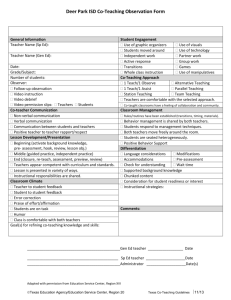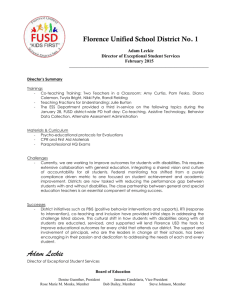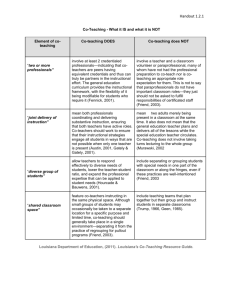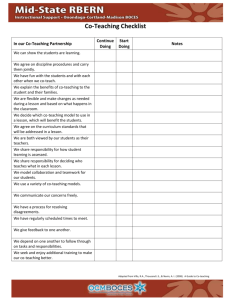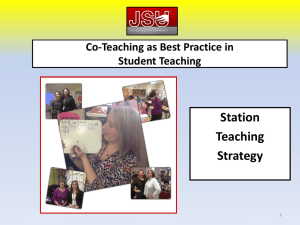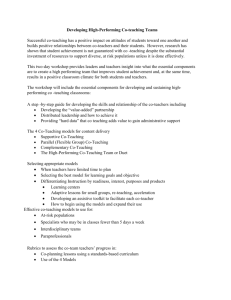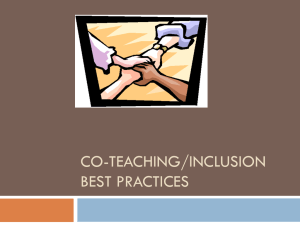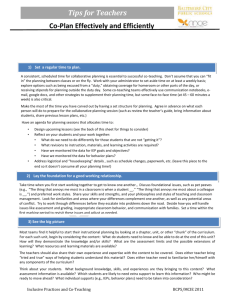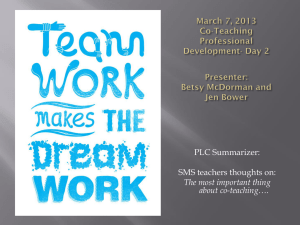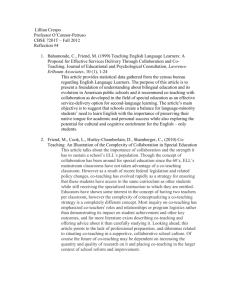Co-Teaching Professional Development
advertisement
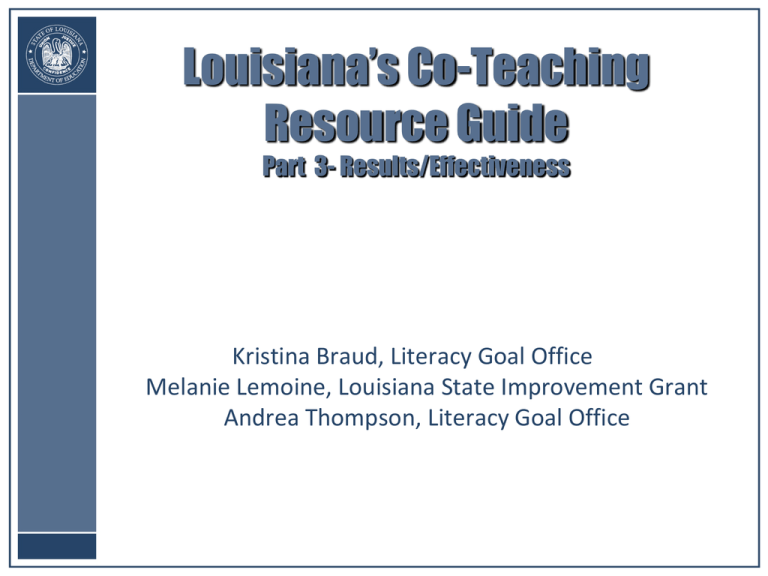
Louisiana’s Co-Teaching Resource Guide Part 3- Results/Effectiveness Kristina Braud, Literacy Goal Office Melanie Lemoine, Louisiana State Improvement Grant Andrea Thompson, Literacy Goal Office Guide’s Location: accessguide.doe.louisiana.gov/site%20documents/FINALcoteaching_guide.pdf Co-Teaching Resource Guide Part 3--Results 3 Why Measure Co-Teaching Efforts 4 • Student learning and academic growth are expected outcomes of effective co-teaching • Teachers’ instructional skills can improve • Academic data indicates effectiveness • Related data improvement indicates effectiveness • Student progress improves longitudinally Why Measure Co-Teaching Efforts • Informal instrument for co-teachers and their supervisors drive conversations • Documents the effectiveness of co-teaching classrooms • Helps focus on areas that need improvement, and pinpoints the component(s) affecting success • Directs professional development What to Measure • Administrative Support • Team Building • Planning • Implementation of co-teaching approaches • Student Outcomes How to Gather Evidence on Co-Teaching Effectiveness • Rating Scale • Rubric • Reflective Guide • Administrator Walk-through • Co-teaching Observation Checklist – Quality Indicators –General and Approach-specific Co-Teaching Observation Checklist • Quality Indicators • Snapshot of behaviors that drive conversations to adjust planning and implementation • Uses simultaneously for both coteachers Support, Measure, Adjust 11 • Ensure that teachers who are co-teaching receive professional development so they maximize the contribution of both partners. • Use curriculum based and other measures that can document the amount of educational progress students (those with and without disabilities) make in co-taught classes. Inclusion Works Students Making Academic Progress With Disabilities Without Disabilities Traditional Class Setting Inclusion Class Setting Math 35.9% Math 43.3% Reading 41.9% Reading 45.9% Math 39.0% Math 58.8% Reading 47.1% Reading 50.7% Essential Elements to the Change Process Common Vision Incentives Knowledge and Skills Resources Action Plan Result No Yes Yes Yes Yes Confusion Yes No Yes Yes Yes Resistance Yes Yes No Yes Yes Anxiety Yes Yes Yes No Yes Frustration Yes Yes Yes Yes No Treadmill Yes Yes Yes Yes Yes Change Adapted from Knosler, in Pearl, n.d. Other Resources in the Guide • Co-Teaching Connection • Access Center • Sample Lesson Plans • Data Profile (individual data summary) Other Resources in the Guide • 50 Ways to Keep Your Co-Teacher • The IRIS Center Council for Exceptional Children – (CEC Standards for Professional Practice) • IDEA – Individuals with Disabilities Act • INTASC – Interstate New Teacher Assessment and Support Consortium Final Notes • Take baby steps rather than mass inclusion without proper support • Find pockets of promise and build • Utilize resources and links in the guide • Contact the Literacy Goal Office or LaSIG
